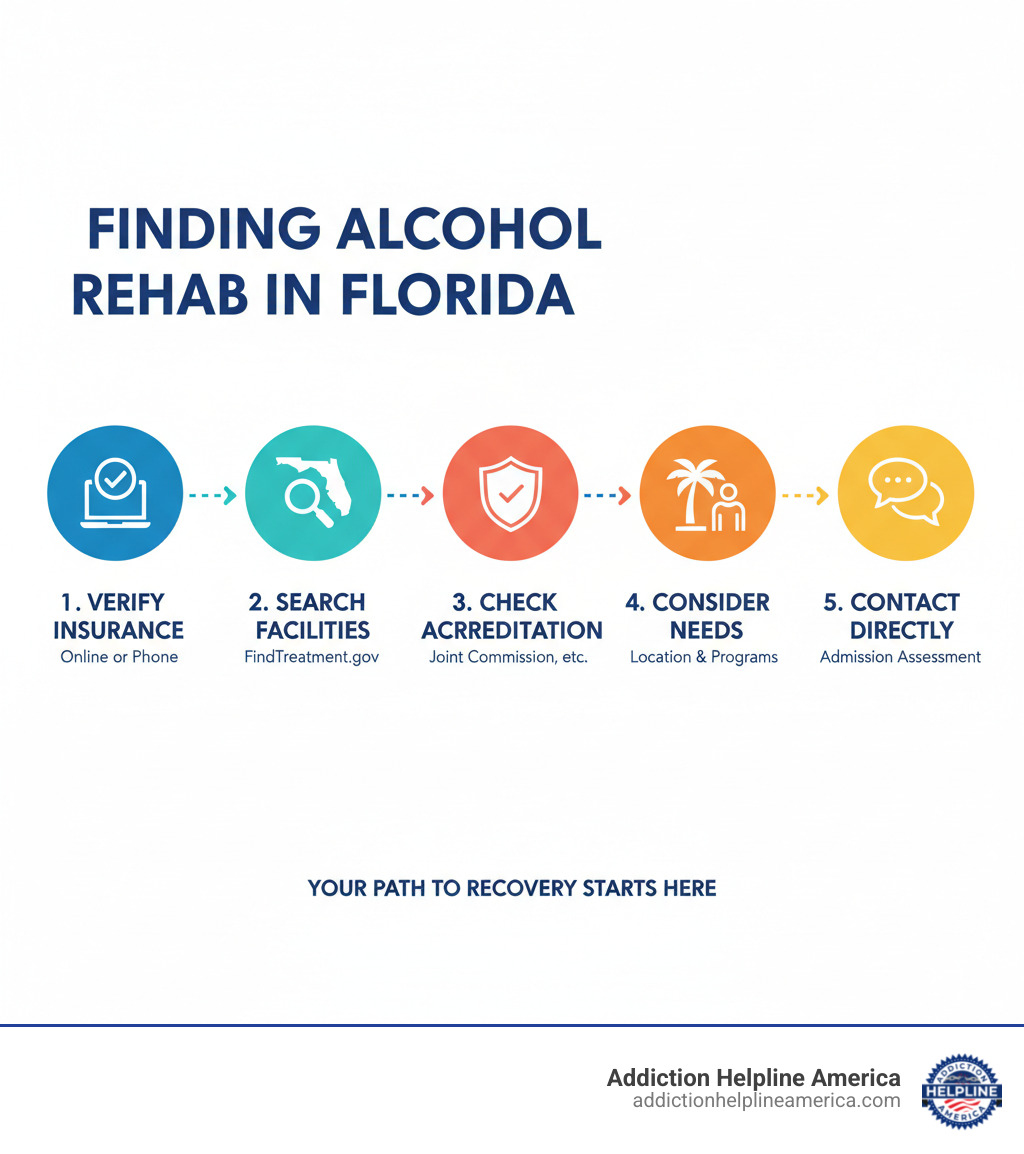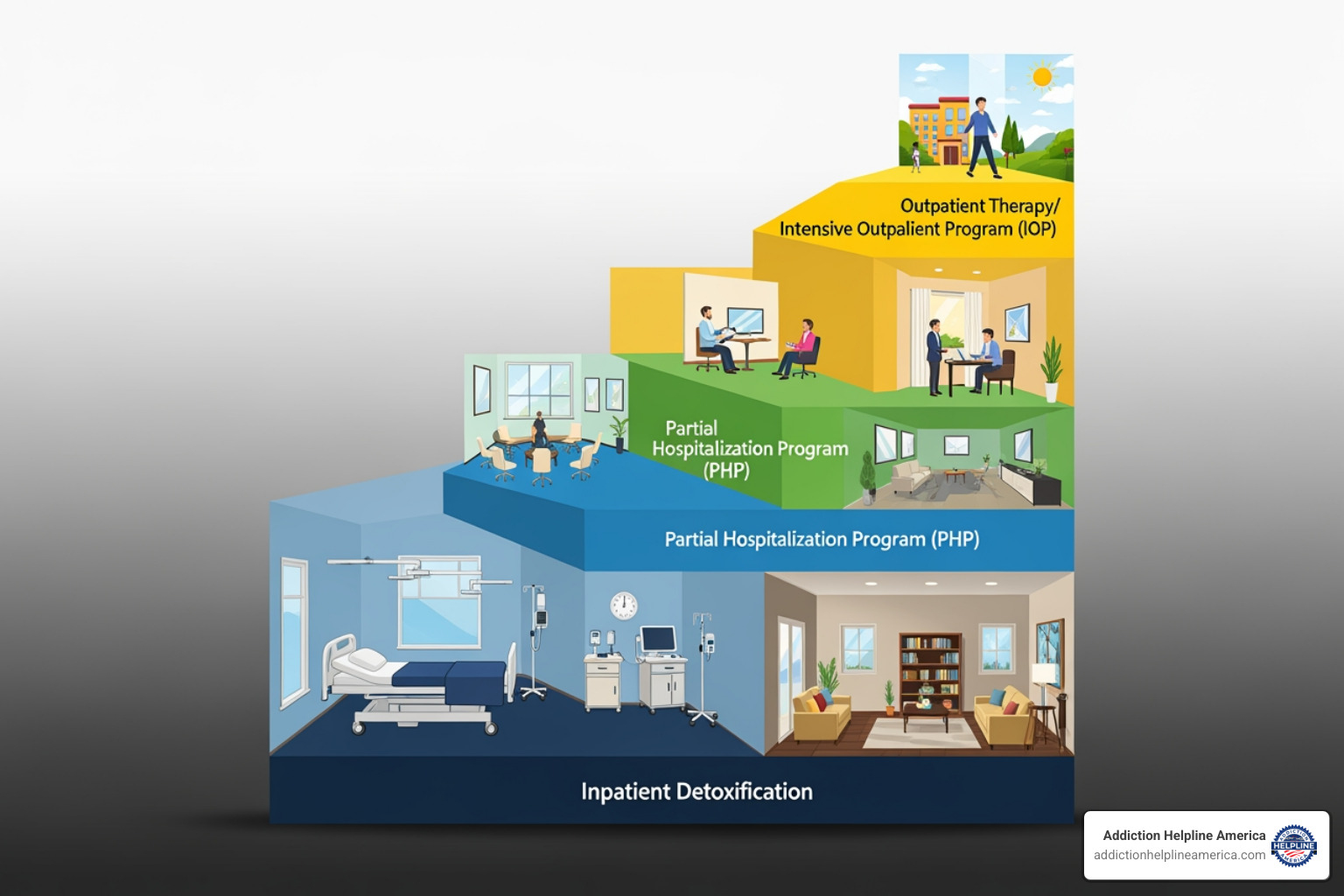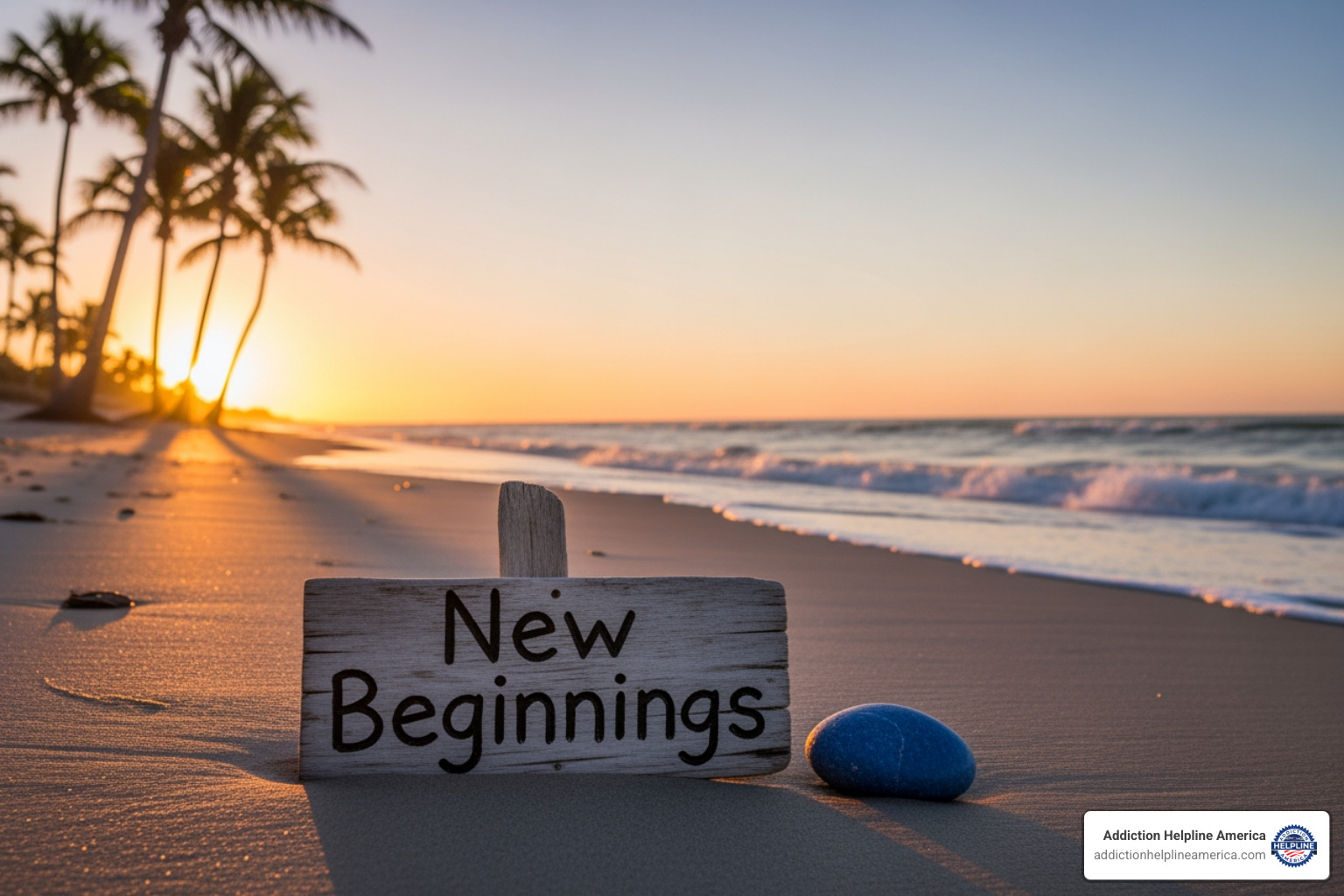
Why Finding the Right Alcohol Rehab in Florida Matters
Where can I find alcohol rehab in Florida? You can find alcohol rehab centers throughout Florida by:
- Searching online directories – FindTreatment.gov and similar sites list hundreds of licensed facilities
- Contacting state resources – The Florida Department of Children and Families maintains current listings
- Calling a 24/7 helpline – Get immediate guidance and local referrals
- Verifying insurance coverage – Most Florida plans cover addiction treatment
- Focusing on major metro areas – Miami, Tampa, Orlando, and Jacksonville have numerous options
You’re not alone. Millions of Americans struggle with Alcohol Use Disorder (AUD). Florida offers a unique recovery landscape with hundreds of alcohol and drug rehab centers across the state, from beachfront residential programs to intensive outpatient care. However, having so many options can feel overwhelming when you need help right now.
The good news is that Florida insurance plans typically cover mental health and addiction treatment, making recovery more accessible than you might think. Whether you’re in Miami, Tampa, Jacksonville, or a smaller community, licensed facilities are ready to help.
This guide cuts through the confusion. We’ll show you how to find reputable alcohol rehab centers in Florida, what questions to ask, how to verify insurance, and what to expect during admission. You’ll learn about different treatment types and how to choose a facility that fits your situation.
At Addiction Helpline America, we’ve helped thousands of individuals and families steer the often-confusing process of where can I find alcohol rehab in Florida, connecting them with appropriate treatment programs that align with their unique circumstances. Our experience has shown us that finding the right help quickly can make all the difference in starting the recovery journey.
Quick look at where can i find alcohol rehab in florida:
Understanding Your Alcohol Rehab Options in Florida
If you’re searching for where can I find alcohol rehab in Florida, you’re probably finding there’s no simple answer. That’s actually good news—it means Florida offers a wide range of treatment options designed to meet you exactly where you are in your journey.
Think of alcohol rehab not as a single destination, but as a continuum of care. This means there are different levels of treatment intensity, from round-the-clock medical supervision to flexible programs that let you keep working. The “best” rehab isn’t the most expensive—it’s the one that matches your specific needs, the severity of your alcohol use disorder, and your life circumstances.
Florida’s comprehensive approach to addiction treatment recognizes that your recovery path is uniquely yours. What worked for someone else might not be what you need. Let’s walk through your options.
Medically Supervised Detox: The First Step
If you’ve been drinking heavily, stopping suddenly can be dangerous. Alcohol withdrawal can cause seizures, severe anxiety, and other life-threatening conditions. Medical detox provides 24/7 medical supervision to keep you safe during these critical first days. Medical professionals monitor your vital signs and manage symptoms with appropriate medications to ensure you’re physically stable.
The goal is to safely remove alcohol from your body while keeping you as comfortable as possible. This usually takes a few days to a week. Detox isn’t treatment itself—it’s the foundation. Once you’re stable, you’re ready for the real work of recovery.
Inpatient vs. Outpatient Programs
After detox, you’ll move into the heart of treatment, where you’ll learn new coping skills and understand the roots of your drinking. You have two main options: inpatient and outpatient programs.
| Feature | Inpatient (Residential) Rehab | Outpatient Rehab |
|---|---|---|
| Environment | Immersive, live-in facility, removed from triggers | Live at home, commute to treatment |
| Support Level | 24/7 medical and therapeutic support, highly structured | Scheduled sessions, independent living, self-reliance |
| Intensity | High, full-time engagement in therapy and activities | Varied (IOP, PHP), part-time, allows for work/school |
| Focus | Deep therapeutic work, skill-building, community living | Applying recovery skills in real-world settings |
| Duration | Typically 30, 60, or 90 days, but can vary | Flexible, can be long-term, step-down from inpatient |
| Cost | Generally higher due to accommodation and 24/7 care | Generally lower, no living expenses included |
Inpatient or residential rehab means you live at the treatment facility, typically for 30, 60, or 90 days. You’re completely removed from triggers and temptations. Every day is structured with individual therapy, group counseling, and educational workshops. The immersive nature of residential treatment gives you space to focus entirely on healing, surrounded by supportive staff and peers.
Outpatient programs offer more flexibility. You live at home and travel to the facility for treatment sessions, such as Intensive Outpatient Programs (IOP) or Partial Hospitalization Programs (PHP). This lets you maintain your job or family responsibilities while getting help. It’s often a good choice if you have a strong support system or are stepping down from a residential program. The key difference is that inpatient treatment removes you from your environment to heal, while outpatient treatment teaches you to stay sober within your environment.
Specialized Alcohol Rehab Programs
Beyond inpatient and outpatient care, many Florida facilities offer specialized programs. When you’re asking where can I find alcohol rehab in Florida that truly understands you, these options can make all the difference.
Dual diagnosis treatment addresses co-occurring mental health conditions like depression, anxiety, or PTSD alongside alcohol use. Treating both conditions simultaneously is crucial for long-term success, as they often influence each other. Integrated care programs have therapists who understand how these issues interact.
Veterans programs acknowledge the unique challenges of military service, such as combat trauma and the difficulty of transitioning to civilian life. These programs often incorporate trauma-informed care and connect you with other veterans.
Gender-specific rehab creates a space where men or women can be completely honest without worrying about judgment from the opposite sex. Women-only programs may address issues like trauma and parenting, while men-only programs might tackle topics like anger and societal expectations.
LGBTQ+ affirming care recognizes that members of the LGBTQ+ community face specific stressors that can contribute to substance use. Affirming programs provide a safe, non-judgmental environment where you can focus on recovery.
Professional-focused programs serve healthcare workers, first responders, lawyers, and others whose careers have specific demands. These programs understand the pressure of high-stakes work and the need for confidentiality.
Effective treatment is personalized and compassionate. At Addiction Helpline America, we help you steer these options to find the program that’s right for you—the one that gives you the best chance at lasting recovery.
Where Can I Find Alcohol Rehab in Florida? A Step-by-Step Guide
When you’re searching for help with alcohol addiction, the last thing you need is more confusion. Yet you may be faced with hundreds of alcohol and drug rehabs scattered across Florida. This abundance means there’s almost certainly a facility that fits your specific situation, whether you need gender-specific care or a place that treats both addiction and depression.
The challenge isn’t finding any rehab—it’s finding the right one. A reputable center that aligns with your values, meets professional standards, and offers the specific care you need. A methodical approach makes all the difference.
How to Find a Reputable Alcohol Rehab Center in Florida
Not all rehab centers are created equal. When you’re asking yourself “where can I find alcohol rehab in Florida” that you can trust, start by checking these credentials.
State licensing comes first. Every addiction treatment facility in Florida must be licensed by the Florida Department of Children and Families (DCF). This is the law, and it ensures the facility meets basic standards for safety, staffing, and quality of care.
Accreditation takes things further. While licensing is mandatory, accreditation is a voluntary process where facilities invite rigorous scrutiny from respected national organizations. The Joint Commission (JCAHO) and the Commission on Accreditation of Rehabilitation Facilities (CARF) are two of the most respected accrediting bodies. Accreditation is a strong indicator of a high-quality program.
Professional associations signal commitment. Membership in organizations like the National Association of Addiction Treatment Providers (NAATP) often indicates a facility’s commitment to ethical practices and staying current with industry standards.
Online directories simplify your search. The Substance Abuse and Mental Health Services Administration maintains a comprehensive database at FindTreatment.gov. This government resource lets you search by location, services, and payment options.
Real patient experiences matter too. While online reviews shouldn’t replace official credentials, they can offer glimpses into daily life at a facility. Look for patterns in feedback, but always verify information directly with the facility, as programs and staff can change.
Key Factors to Consider When Choosing a Facility
Once you’ve identified reputable centers, it’s time to get specific. These factors can make the difference between a program that transforms your life and one that doesn’t click.
Treatment philosophy matters. Does the facility rely on evidence-based therapies backed by scientific research? Look for approaches like Cognitive Behavioral Therapy (CBT), Dialectical Behavior Therapy (DBT), and Motivational Interviewing. Some centers also incorporate holistic care, family therapy, and mindfulness practices.
The staff makes or breaks your experience. You want qualified professionals who know what they’re doing. Look for teams that include physicians, nurses, licensed therapists, and experienced case managers.
Attention matters when you’re healing. The client-to-counselor ratio tells you how much individual attention you’ll receive. A lower ratio generally means more personalized care, ensuring you don’t get lost in the crowd.
Your environment affects your recovery. While amenities aren’t the most important factor, a comfortable, supportive environment helps healing. Many Florida rehabs offer gyms, pools, and peaceful outdoor spaces. A calming atmosphere can make a real difference.
Time commitments vary. Treatment programs typically come in 30, 60, or 90-day increments, but the ideal length depends on your situation. Some programs offer flexible stays based on individual progress.
Choosing a rehab is one of the most empowering decisions you’ll make. Take your time with it.
Finding Local Rehab Centers in Major Florida Cities
Florida’s rehab options are spread across its diverse geography. When you’re asking where can I find alcohol rehab in Florida with a specific location in mind, here’s what different regions offer.
Miami and South Florida represent a major treatment hub. This metropolitan area provides everything from luxury inpatient facilities to accessible outpatient programs, with diverse cultural approaches reflecting the population.
Orlando balances its tourist reputation with substantial treatment resources. Rehab centers here serve both local residents and people traveling for treatment, offering various levels of care.
Tampa Bay offers a combination of serene environments and urban accessibility. The greater Tampa area attracts people seeking peaceful settings near the water without sacrificing city amenities.
Jacksonville in Northeast Florida provides a substantial number of treatment options. Facilities in this area cater to a broad spectrum of needs, including dual diagnosis and gender-specific programs.
West Palm Beach and Fort Lauderdale host vibrant recovery communities with high concentrations of treatment centers. These cities are known for their comprehensive services and strong alumni networks.
Most online directories let you filter by location, making it easier to find centers close to home or in a new environment for a fresh start. Neither choice is wrong—it’s about what works for you.
Navigating the Cost and Insurance Coverage for Rehab
Let’s talk about money. It’s often the elephant in the room when someone asks, “where can I find alcohol rehab in Florida?” You might think treatment is too expensive or that your insurance won’t cover it. The truth is, recovery is more accessible than you might think.
Thanks to the Affordable Care Act and Mental Health Parity laws, most insurance companies must cover mental health and substance use treatment at the same level as other medical care. This was a game-changer, making addiction treatment a covered health benefit for most people with insurance.
Understanding your benefits and payment options can lift a huge weight off your shoulders, allowing you to focus on what really matters: getting well.
Does Insurance Cover Alcohol Rehab in Florida?
Yes, most Florida insurance plans cover addiction treatment, including major providers like Aetna, Blue Cross Blue Shield, Cigna, Humana, and United Healthcare. Many facilities are in-network with multiple providers, which means lower costs for you.
The first step is verifying your specific benefits. Most rehab centers offer free, confidential insurance verification online or over the phone. When you verify, you’ll want to understand a few key terms. In-network providers have negotiated rates with your insurance company, meaning you’ll pay less out of pocket. Out-of-network providers may still be covered, but your share of the cost will likely be higher.
You’ll also need to know about your deductible (the amount you pay before insurance kicks in) and your copays (fixed amounts for services). Admissions navigators at treatment centers deal with this daily and can explain your specific benefits and costs.
Don’t let confusion about insurance stop you. The verification process is quick, confidential, and gives you clear answers. At Addiction Helpline America, we help people understand their insurance benefits and connect them with facilities that accept their specific plan.
What is the Cost of Alcohol Rehab Without Insurance?
If you don’t have insurance, you still have options. The cost of rehab in Florida varies widely. Inpatient programs and medical detox are typically more expensive due to 24/7 care and accommodation. Outpatient programs generally cost less since you live at home.
Private pay is one option, and many facilities accept credit cards or offer flexible payment plans to spread the cost over time. Some centers provide sliding scale fees based on your income, adjusting the cost to match your financial situation.
State-funded programs are another possibility. While they may have waiting lists, they can be a lifeline for people with limited resources. You can search for these options through SAMHSA’s FindTreatment.gov.
The investment in recovery is an investment in your life. There are more options than you might realize, and we’re here to help you find them.
Your Path to Recovery: From Admission to Aftercare
The decision to seek help is one of the most courageous steps you’ll ever take. The benefits of attending an alcohol rehab center in Florida extend far beyond simply stopping drinking. You’ll learn coping skills, connect with peers who understand, and build a foundation for lasting sobriety that can change your life.
Recovery is about healing from the inside out and reclaiming the life you deserve. Alumni from Florida facilities often describe their experiences as genuinely life-changing, giving them tools to live free from addiction. Let’s walk through what this journey looks like, from your first call to the ongoing support that keeps you strong.
What to Expect During the Admissions Process
If you’re wondering where can I find alcohol rehab in Florida and feeling nervous about what comes next, take a deep breath. The admissions process is designed with your comfort in mind.
Your journey typically begins with a confidential phone call. Many centers offer this 24/7. You’ll speak with an admissions navigator trained to listen without judgment. They’ll gather basic information in a conversation about how they can help.
Next comes a pre-assessment with a clinical team to understand your specific needs. They’ll ask about your drinking history and any mental health concerns to create a treatment plan that fits your life and recommend the right level of care.
The insurance verification step happens behind the scenes. As discussed earlier, most centers will handle this for you, figuring out your coverage and explaining any out-of-pocket costs.
If you’re traveling to your chosen facility, admissions teams can often help coordinate everything, from booking flights to arranging transportation, removing one more barrier to getting help.
As for what to pack, you’ll receive a detailed list. Generally, you’ll want comfortable clothes, personal hygiene items, and a book or journal. Cell phones are usually allowed with some restrictions, but laptops are typically not permitted to help you focus inward.
Some facilities even offer same-day admission, understanding that when you’re ready for help, waiting can feel impossible.
The Crucial Role of Aftercare and Ongoing Support
Leaving rehab isn’t the finish line; it’s the starting line for the rest of your recovery. The work you do after treatment is just as important as the work you do during it.
Before you leave, you’ll create a personalized aftercare plan with your treatment team. This roadmap outlines how you’ll handle triggers, manage cravings, and steer challenging situations.
Alumni programs create an ongoing community that understands. Many centers host meetings, workshops, and events where former patients reconnect and support each other. Some even offer apps to keep you connected to your recovery community.
Support groups like AA, NA, or secular alternatives like SMART Recovery can become part of your weekly routine. There’s something powerful about connecting with people who have walked a similar path.
Sober living homes can provide a bridge between structured residential treatment and returning home. You’ll live with others committed to sobriety, with house rules that support recovery.
Continued therapy sessions give you a safe space to process new challenges as they arise. Professional support can make all the difference as you steer life’s stresses.
How to Support a Loved One Seeking Treatment
If someone you love is asking where can I find alcohol rehab in Florida, your support can be a deciding factor.
The key is offering support without enabling. This means showing love and encouragement while setting boundaries around actions that make it easier for them to keep drinking. Setting boundaries isn’t cruel; it’s one of the most loving things you can do.
Family therapy sessions are offered at many facilities for good reason. Addiction affects entire family systems. These sessions help heal damaged relationships and teach everyone how to communicate more effectively. Family members often express gratitude for staff who are dedicated to healing the whole person.
Learning to set and maintain healthy boundaries protects both your well-being and your loved one’s recovery. You can love someone deeply while also saying no to requests that enable their addiction.
Communication strategies matter enormously. Open, honest, and compassionate conversations foster trust. If an intervention becomes necessary, professional resources can guide you through the process.
You need support too. Programs like Al-Anon and Alateen exist for families affected by someone else’s drinking. At Addiction Helpline America, we understand that recovery is a family journey. We can connect you with resources that help you care for yourself while supporting your loved one.
Frequently Asked Questions about Florida Alcohol Rehab
How long does alcohol rehab typically last?
There’s no one-size-fits-all answer. The length of your stay depends on your individual needs, the severity of your alcohol use disorder, and any co-occurring mental health conditions.
Most programs follow common timeframes: 30, 60, or 90 days. These are based on clinical experience about how long it takes to build lasting recovery skills. Many centers offer programs with these durations, while others take a flexible approach with stays based on individual progress. Clinical experience suggests that staying at least 30 days gives you time to build a solid foundation for a new life.
The most effective approach often follows a continuum of care model, where you might start with intensive inpatient treatment and then step down to outpatient care as you progress.
Can I lose my job for going to rehab?
This is a common fear, but federal laws protect your right to seek treatment without losing your job. The Family and Medical Leave Act (FMLA) allows eligible employees to take up to 12 weeks of unpaid, job-protected leave for medical reasons, including substance abuse treatment.
The Americans with Disabilities Act (ADA) classifies addiction as a disability, meaning employers must provide reasonable accommodations for your treatment and cannot discriminate against you for seeking help.
Your treatment is confidential. Employers only need to know that you’re taking protected medical leave. It’s smart to understand your company’s policies, but these federal protections exist to support your recovery without fear of job loss.
What is a typical day in rehab like?
A day in alcohol rehab in Florida is purposefully structured to immerse you in healing and establish healthy routines.
Your morning typically starts with breakfast and a meditation or mindfulness session. The bulk of your day is dedicated to therapy, including individual counseling, group therapy, and educational workshops where you develop coping skills.
Nutritious meals are provided, often in a communal setting that fosters a sense of community. Recreational activities like swimming, yoga, or art therapy are also woven into the schedule. Many Florida facilities offer amenities like a gym or pool, as physical activity is a powerful tool for healing.
You’ll also have downtime for reflection and journaling. Evening activities might include support group meetings and wrap-up discussions. This structured environment provides support and gives you space to focus entirely on your recovery.
Conclusion: Your Lifeline to a New Beginning in Florida
You’ve taken an important step just by reading this guide. Understanding where can I find alcohol rehab in Florida isn’t just about locations—it’s about hope and the courage to imagine a different future.
We’ve walked through Florida’s rich landscape of recovery options. You now know about the different levels of care, from medical detox to residential and outpatient programs. You’ve learned that specialized programs exist for veterans, those with co-occurring mental health conditions, and for communities that need affirming care.
We’ve shown you how to spot a reputable facility by checking for state licensing from the Florida Department of Children and Families and accreditation from organizations like The Joint Commission. These are your assurance of safety and quality.
The financial piece can feel like an obstacle, but most Florida insurance plans cover addiction treatment. If insurance isn’t an option, payment plans, sliding scale fees, and state-funded programs exist to help. The investment you make in recovery pays dividends for the rest of your life.
Recovery is a journey, not a destination. It starts with a brave phone call and extends into aftercare and the daily practice of choosing sobriety. You don’t have to walk this path alone. Florida’s many treatment centers represent doorways to healing, and one of them is right for you.
At Addiction Helpline America, we understand that finding the right fit matters. We’ve helped thousands of people steer treatment options, and we’re here to offer you that same personalized guidance. Whether you’re in Miami, Jacksonville, Tampa, or a small town in between, we can connect you with a program that understands your unique situation.
Your new beginning is waiting. Take that courageous step today.
Our helpline is 100%
free & confidential
If you or someone you care about is struggling with drug or alcohol addiction, we can help you explore your recovery options. Don’t face this challenge alone—seek support from us.
Programs
Resources
Will my insurance
cover addiction
treatment?
We're ready to help
Find the best
drug or alcohol treatment
center
Are you or a loved one struggling with addiction? Call today to speak to a treatment expert.

















